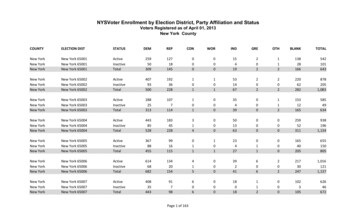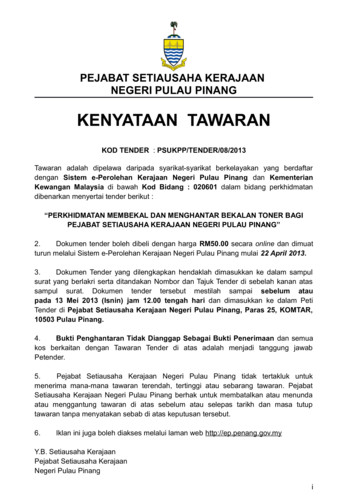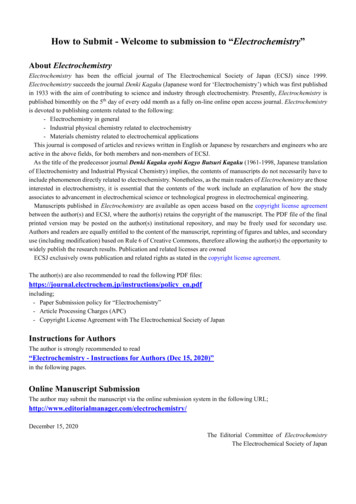NEW YORK UNIVERSITY BULLETIN ROBERT F. WAGNER
NEW YORK UNIVERSITY BULLETINROBERT F.WAGNERGRADUATE SCHOOLOF PUBLIC SERVICE2017 - 2019
NEW YORK UNIVERSITY BULLETIN 2017 - 2019ROBERT F. WAGNERGRADUATE SCHOOL OF PUBLIC SERVICEThe Puck Building, 295 Lafayette Street, 2nd Floor, New York, NY 10012wagner.nyu.eduCONTENTSI.New York UniversityII.Robert F. Wagner Graduate School of Public ServiceIII.General Admission RequirementsIV.Description and Requirements of Academic ProgramsV.List of CoursesVI.Library and Program-related FacilitiesVII.Academic CalendarVIII.Cost of AttendanceIX.Financial AssistanceX.Refund PolicyXI.Degree and Certificate Programs as RegisteredXII.Contact InformationNOTICE: The policies, requirements, course offerings, schedules, activities, tuition, fees, and calendar of the school and its departments andprograms set forth in this bulletin are subject to change without notice at any time at the sole discretion of the administration. Such changesmay be of any nature, including, but not limited to, the elimination of the school, programs, classes, or activities; the relocation or modificationof the content of any of the foregoing; and the cancellation of scheduled classes or other academic activities.Payment of tuition or attendance at any classes shall constitute a student’s acceptance of the administration’s rights as set forth in the aboveparagraph.2
NEW YORK UNIVERSITYMore than 175 years ago, Albert Gallatin, the distinguished statesman who served assecretary of the treasury under Presidents Thomas Jefferson and James Madison,declared his intention to establish “in this immense and fast-growing city . asystem of rational and practical education fitting for all and graciously opened to all.”Founded in 1831, New York University is now one of the largest private universities inthe United States. Of the more than 3,000 colleges and universities in the country, NewYork University is one of only 60 member institutions of the distinguished Association ofAmerican Universities.The University includes numerous schools, colleges, and institutes at major centers inManhattan, Brooklyn, Abu Dhabi (UAE), and Shanghai. In addition, the University operatesa branch campus program in Rockland County at St. Thomas Aquinas College. Certain ofthe University’s research facilities, notably the Nelson Institute of Environmental Medicine,are located in Sterling Forest, near Tuxedo, New York. Although overall the Universityis large, the divisions are small- to moderate-sized units—each with its own traditions,programs, and faculty.The University offers more than 6,000 courses and grants more than 25 different degrees.Since its founding, New York University has been a private university. It operates undera board of trustees and derives its income from tuition, endowment, grants from privatefoundations and government, and gifts from friends, alumni, corporations, and other privatephilanthropic sources.The University is committed to a policy of equal treatment and opportunity in every aspectof its relations with its faculty, students, and staff members, without regard to race, color,religion, sex, sexual orientation, gender and/or gender identity or expression, marital orparental status, national origin, ethnicity, citizenship status, veteran or military status,age, disability, and any other legally protected basis.Inquiries regarding the application of the federal laws and regulations concerning affirmativeaction and antidiscrimination policies and procedures at New York University may be referredto Mary Signor, Executive Director, Office of Equal Opportunity, New York University, 726Broadway, 7th Floor, New York, NY 10003; 212.998.2352. Inquiries may also be referred tothe director of the Office of Federal Contract Compliance, US Department of Labor.New York University is a member of the Association of American Universities and is accreditedby the Middle States Association of Colleges and Schools (Commission on Higher Educationof the Middle States Association of Colleges and Schools, 3624 Market Street, Philadelphia,PA 19104; 215.662.5606). Individual undergraduate, graduate, and professional programsand schools are accredited by the appropriate specialized accrediting agencies.3
SENIOR UNIVERSITY ADMINISTRATIONAndrew D. Hamilton, BSc, MSc, PhD, PresidentRichard S. Baum, BA, Chief of Staff to thePresidentRobert Berne, BS, MBA, PhD, Executive VicePresident for HealthLynne P. Brown, BA, MA, PhD, Senior VicePresident for University Relations and Public AffairsMartin S. Dorph, BS, MBA, JD, Executive VicePresident, Finance and Information TechnologyKatherine Fleming, BA, MA, PhD, ProvostTracey Gardner, BA, MPA, Deputy Chief of StaffDebra A. LaMorte, BA, JD, Senior Vice President forDevelopment and Alumni RelationsLinda G. Mills, BA, JD, MSW, PhD, Vice Chancellorand Senior Provost for Global Programs and UniversityLife, NYU; Associate Vice Chancellor for Admissionsand Financial Support, NYU Abu Dhabi; Lisa EllenGoldberg ProfessorTerrance Nolan, BA, JD, LLM, General Counsel andSecretary of the UniversityEllen Schall, BA, JD, Senior Presidential FellowUli Baer, BA, MPhi, PhD, Vice Provost for Faculty andUndergraduate Academic AffairsJohn Beckman, BA, Vice President for PublicAffairsLinda Chiarelli, BE, JD, Vice President, CapitalProjects and FacilitiesSabrina Ellis, BA, MS, Vice President of HumanResources(AS OF SEPTEMBER 2017)Karen Gulino, BCE, MPA, Associate Vice Provost forStrategy & Chief of Staff to the ProvostLisa M. Coleman, BA, MA, PhD, Senior VicePresident for Global Inclusion, Diversity, and StrategicInnovation and Chief Diversity OfficerPaul M. Horn, BS, PhD, Senior Vice Provost forResearch; Senior Vice Dean for Strategic Initiativesand Entrepreneurship, Tandon School of EngineeringAnthony Jiga, BA, MPP, Vice President for Budgetand PlanningMJ Knoll-Finn, BA, MBA, Vice President forEnrollment ManagementMarlon Lynch, BA, MA, Vice President for GlobalCampus SafetyCarol Morrow, BA, MA, PhD, Vice ProvostLen Peters, BS, MS, Vice President and ChiefInformation OfficerCybele Raver, BA, MS, MPhil, PhD, Vice Provost forAcademic and Research AffairsClay Shirky, BA, Vice Provost for EducationalTechnologiesMatthew S. Santirocco, BA, BA [Cantab.]; MPhil,MA [Cantab.], PhD; hon.: MA, Senior Vice Provost forAcademic AffairsKatepalli R. Sreenivasan, BE, ME, MA, PhD; hon.:DSc, Executive Vice Provost for Engineering andApplied Sciences; Dean, Tandon School of EngineeringMarc L. Wais, BS, MBA, EdM, EdD, Senior VicePresident for Student AffairsDEANS AND DIRECTORSCharles N. Bertolami, DDS, DMedSc, Herman RobertFox Dean, College of DentistryAlfred H. Bloom, BA, PhD; hon.: LLD, ViceChancellor, NYU Abu DhabiDominic Brewer, BA, MA, PhD, Gale and Ira DrukierDean, Steinhardt School of Culture, Education, andHuman DevelopmentThomas J. Carew, BA, MA, PhD; hon.: MA, Anne andJoel Ehrenkranz Dean, Faculty of Arts and ScienceRussel Caflisch, BS, MS, PhD, Director, CourantInstitute of MathematicsGeorgina Dopico, MA, PhD, Dean for Humanities,Faculty of Arts and ScienceDennis Di Lorenzo, BA, Harvey J. Stedman Dean,School of Professional StudiesClayton Gillette, BA, JD, Director Marron Institute ofUrban ManagementSherry L. Glied, BA, MA, PhD, Dean, Robert F.Wagner Graduate School of Public ServiceAllyson Green, BFA, MFA, Dean, Tisch School of theArtsRobert I. Grossman, BS, MD, Saul J. Farber Dean,NYU School of Medicine; Chief Executive Officer, NYUHospitals CenterNeil Guterman, AB, AM, PhD, Dean, Silver School ofSocial WorkPhillip Brian Harper, BA, MA, MFA, PhD, Dean,Graduate School of Arts and ScienceCheryl G. Healton, BA, MPA, DrPH, Director, GlobalInstitute of Public Health; Dean of Global Public HealthPeter Blair Henry, BA, BA, PhD, Dean, Leonard N.Stern School of BusinessGene Jarrett, BA, MA, PhD, Seryl Kushner Dean,College of Arts and ScienceAlexander Jones, BA, PhD, Interim Director,Institute for the Study of the Ancient WorldSteven E. Koonin, BS, PhD, Director, Center forUrban Science and ProgressMichael Laver, BA (hons.), MA, PhD, Dean for SocialSciences, Faculty of Arts and ScienceJeffrey S. Lehman, BA, JD, MPP, Vice Chancellor,NYU ShanghaiCarol A. Mandel, BA, MA, MSLS, Dean of LibrariesGeeta Menon, BA, MA, PhD, Dean, UndergraduateCollege, Leonard N. Stern School of BusinessTrevor W. Morrison, BA (hons.) [British Columbia];JD, Dean, School of LawJulie Mostov, BA, MA, PhD, Dean of Liberal StudiesFabio Piano, BS, MA, PhD, Provost, NYU Abu DhabiMichael D. Purugganan, BS, MA, PhD, Dean forScience, Faculty of Arts and ScienceChristine Poggi, BA, MA, PhD, Judy and MichaelSteinhardt Director, Institute of Fine ArtsKatepalli R. Sreenivasan, BE, ME, MA, PhD; hon.:DSc, Dean, Tandon School of Engineering; ExecutiveVice Provost for Engineering and Applied SciencesEileen Sullivan-Marx, BSN, MS, PhD, CRNP, RN,FAAN, Dean, Rory Meyers College of NursingJoanna Waley-Cohen, BA, MA, PhD, Provost, NYUShanghaiSusanne L. Wofford, BA; BPhil [Oxon.], PhD, Dean,Gallatin School of Individualized StudyYu Lizhong, BSc, PhD, Chancellor, NYU Shanghai4
BOARD OF TRUSTEESWilliam R. Berkley, BS, MBA, ChairRonald D. Abramson, BA, JD; hon.: DFAKhaldoon Khalifa Al Mubarak, BSRalph Alexander, BS, MS, MSTaffi Ayodele, BA, MBAPhyllis Putter Barasch, BS, MA, MBAMaria Bartiromo, BAMarc H. Bell, BS, MSCasey Box, AA, BA, MPABill Brewer, BA, JD, LLMSharon Chang, BA, MAEvan R. Chesler, BA, MA, JDSteven M. Cohen, BA, JDStuyvie Comfort, BSE, JD, LLMMichael Denkensohn, BSFiona Druckenmiller, BA, MBAGale Drukier, BS, MS, EdDJoel S. Ehrenkranz, BS, MBA, LLB, LLMLaurence D. Fink, BA, MBALuiz Fraga, BA, MBAMark Fung, BA, MA, JD, PhDJeffrey S. Gould, BA, JDLisa Yoo Hahn, BA, JDAndrew Hamilton, BSc, MSc, PhDNatalie Holder, BS, JD, MBABeverly Hyman, BA, MS, PhDMitchell Jacobson, BA, JDBoris Jordan, BAJonathan C. Kim, BSCharles Klein, BA, JDAndre J. L. Koo, BA, MBAJoseph Landy, BS, MBAMark Leslie, BABrian A. Levine, BS, MS, MDAmanda Lipitz, BFAMartin Lipton, BS, LLBKelly Kennedy Mack, BA, MBAMimi M. D. Marziani, BA, JDHoward Meyers, BSSteven S. Miller, BA, JDConstance J. Milstein, BA, JDDavid C. Oxman, BA, LLBJohn Paulson, BS, MBACatherine B. Reynolds, BABrett B. Rochkind, BS, MBAWilliam C. Rudin, BSConstance Silver, BS, MSW, PhDLarry A. Silverstein, BA, LLBLisa Silverstein, BAJay SteinJoseph S. Steinberg, BA, MBAJudy Steinhardt, BA, EdMJessica Swartz, BA, MA, PhDAdam Taki, BA, MAChandrika Tandon, BA, MBADaniel R. Tisch, BAWenliang WangNina Weissberg, BA, MAAnthony Welters, BA, JDShelby White, BA, MALeonard A. Wilf, BA, JD, LLMTamara Winn, BA, JD, MBASascia Yuan, BACharles M. Zegar, BS, MS, MSLIFE TRUSTEESDiane BelferArthur L. Carter, BA, MBAGeraldine H. ColesJohn J. Creedon, BS, LLB, LLMMaurice R. Greenberg, LLB; hon.: JD, LLDHenry Kaufman, BA, MS, PhD; hon.: LHD, LLDHelen L. Kimmel, BARichard Jay Kogan, BA, MBAKenneth G. Langone, BA, MBADonald B. MarronThomas S. Murphy, BSME, MBAHerbert M. Paul, BBA, MBA, JD, LLME. John Rosenwald, Jr., BA, MBAMarie SchwartzJoel E. Smilow, BA, MBASheldon H. SolowMichael H. Steinhardt, BSRobert F. Wright, BA, MBAWilliam D. Zabel, BA, LLBTRUSTEE ASSOCIATESBruce Berger, BSLeonard Boxer, BS, LLBJane Eisner Bram, BA, MSW, PhDBetty Weinberg Ellerin, BA, LLBNorman Goodman, BA, JDMarvin Leffler, BS, MBAJeffrey H. Lynford, BA, MPA, JD5
THE ROBERT F. WAGNERGRADUATE SCHOOL OF PUBLIC SERVICENew York University’s Robert F. Wagner Graduate School of PublicService (NYU Wagner) prepares public service leaders to translateideas into actions that have an effective and lasting impact on thepublic good. The school was named for the three-term mayor of NewYork, Robert F. Wagner, who was renowned for his honesty, compassion,and commitment to public service—ideals that continue to inspire andshape the NYU Wagner community today.Established in 1938, NYU Wagner offers Master of Public Administration,Master of Urban Planning, Master of Science in Public Policy, ExecutiveMaster of Public Administration, and Doctor of Philosophy degreeprograms. Through these rigorous programs, students gain critical skills,a deep understanding of context surrounding public service challenges,and access to all New York City has to offer—which they can apply tocities across the globe.Our diverse student body enjoys an open, interactive educationalsetting that blends theory in the classroom with practice in the field.The majority of students work in some capacity while in school, whichenhances the educational experience and allows students to hone theirskills in real time. Located in the heart of New York City, one of theworld’s great metropolises, and surrounded by hundreds of thousands ofpublic service jobs, NYU Wagner is perfectly positioned to prepare futurepublic service leaders to create positive change.6
ADMINISTRATION AND FACULTY OFNYU WAGNER (AS OF SEPTEMBER 1, 2017)Sherry GliedDean, Professor of Public ServicePhD, Harvard UniversityJacob FaberAssistant Professor of Public ServicePhD, New York University (Sociology)Anthony BertelliProfessor of the Politics of Public PolicyPhD, University of ChicagoErica Gabrielle FoldyAssociate Professor of Public and NonprofitManagementPhD, Boston CollegeRobert BerneProfessor of Public Policy and FinancialManagement; Executive Vice President for Healthat New York UniversityPhD, Cornell UniversityJohn GershmanAssociate Professor of Public ServiceMA, University of California, BerkeleyJohn BillingsProfessor of Health Policy and Public ServiceJ.D., University of California, BerkeleyZhan GuoAssociate Professor of Urban Planning andTransportation PolicyPhD, Massachusetts Institute of TechnologyThom BlaylockClinical Assistant ProfessorMFA, Columbia University School of the ArtsTatiana HomonoffAssistant Professor of Economics and Public PolicyPhD, Princeton UniversityJan BlusteinProfessor of Health Policy and MedicineMD, Yale School of Medicine and PhD, New YorkUniversity (Wagner)Natasha IskanderAssociate Professor of Public PolicyPhD, Massachusetts Institute of TechnologyThad CalabreseAssociate Professor of Public and Nonprofit FinancialManagementPhD, New York University (Wagner)Gordon CampbellClinical Professor of Public ServiceJD, University of WashingtonSewin ChanAssociate Professor of Public PolicyPhD, Columbia UniversitySalo CoslovskyAssociate Professor of International DevelopmentPhD, Massachusetts Institute of TechnologyThomas D’AunnoProfessor of ManagementPhD, University of MichiganRajeev DehejiaProfessor of Public Policy and Associate Dean forAcademic AffairsPhD, Harvard UniversityBrian ElbelAssociate Professor of Population Health and HealthPolicyPhD, Yale UniversityNeil KleimanClinical Assistant Professor of Public ServicePhD, Graduate Center of the City University of NewYorkJames KnickmanDerzon Clinical ProfessorPhD, University of PennsylvaniaJulia LaneProfessor of Public ServicePhD, University of Missouri, ColumbiaPaul C. LightPaulette Goddard Professor of Public ServicePhD, University of MichiganJonathan J. MorduchProfessor of Public Policy and Economics; ExecutiveDirector, Financial Access InitiativePhD, Harvard UniversityMitchell L. MossHenry Hart Rice Professor of Urban Policy andPlanning; Director, NYU Wagner’s Rudin Center forTransportation Policy & ManagementPhD, University of Southern CaliforniaTimothy NaftaliClinical Associate Professor of Public ServicePhD, Harvard UniversityDavid ElcottHenry and Marilyn Taub Professor of Practice inPublic Service and LeadershipPhD, Columbia UniversityKatherine O’ReganProfessor of Public Policy; Co-director, NYU’sFurman Center for Real Estate and Urban PolicyPhD, University of California, BerkeleyIngrid Gould EllenPaulette Goddard Professor of Urban Policy andPlanning; Co-director, NYU’s Furman Center for RealEstate and Urban PolicyPhD, Harvard UniversitySonia M. OspinaProfessor of Public Management and PolicyPhD, State University of New York (Stony Brook)7
Atul PokharelAssistant Professor of Public ServicePhD, Massachusetts Institute of TechnologyMartha StarkClinical ProfessorJD, New York University (School of Law)Victor G. RodwinProfessor of Health Policy and ManagementPhD, University of California, BerkeleyLeanna StiefelProfessor of EconomicsPhD, University of Wisconsin-MadisonPatricia SatterstromAssistant ProfessorPhD, Harvard Business SchoolTravis St. ClairAssistant Professor of Public ServicePhD, George Washington UniversityEllen SchallMartin Cherkasky Professor of Health Policy andManagement; NYU Senior Presidential FellowJD, New York University (School of Law)Scott TaitelClinical Professor of Public ServiceMBA, Northeastern UniversityJ. Andrew SinclairClinical Assistant Professor of Public ServicePhD, California Institute of TechnologyPaul SmokeProfessor of Public Finance and PlanningPhD, Massachusetts Institute of TechnologyCassandra ThielAssistant ProfessorPhD, University of PittsburghMona VakilifathiAssistant Professor of Public ServicePhD, University of California, San DiegoRESEARCH, ASSOCIATED, ANDADJUNCT FACULTYThe current list is available at wagner.nyu.edu/community/faculty.(Note: There are approximately 175 adjunct faculty members teaching at NYU Wagner.)8
GENERAL ADMISSIONREQUIREMENTSAdmission to NYU Wagner requires submitting a completed onlineapplication with the following components: a bachelor’s degreeacademic transcript showing the degree conferral date, two letters ofrecommendation, essays, and a resume. Standardized tests such as the GRE orGMAT are not required, but are strongly encouraged. Additional standardizedtesting may be required for international applicants. All applicants whosenative language is not English and who did not receive either a bachelor’s orgraduate degree from an English-speaking institution must take the Test ofEnglish as a Foreign Language (TOEFL) or the International English LanguageTesting System (IELTS).While standardized test scores such as the GRE or GMAT are not required foradmission to NYU Wagner, applicants are strongly recommended to submitscores as part of their application. There is also an optional videoessay component.Further information and application deadlines can be found at wagner.nyu.edu/admissions.Admission decisions are based on the submitted application materials andinclude an assessment of academic potential, impact on public service todate, and fit with the school community.9
DESCRIPTION AND REQUIREMENTSOF ACADEMIC PROGRAMSA. DEGREE: MASTER OF PUBLIC ADMINISTRATION (MPA)Public and Nonprofit Management and Policy ProgramThe oldest degree program at NYU Wagner,the Master of Public Administration in Publicand Nonprofit Management and Policy (MPAPNP) is rooted in a foundation of management,policy, and finance. Students learn a broadskill set that they can transfer to the manyroles, organizations, and sectors that theircareers will span. The program is designedto prepare students for work in diverse publicservice settings, including federal, state, andlocal governments; nonprofit institutions;foundations; international organizations; andprivate sector companies doing public servicework.Students in the MPA-PNP program focuson one of six areas of specialization:(1) management of public and nonprofitorganizations; (2) financial management andpublic finance; (3) public policy analysis;(4) international policy and management; (5)social impact, innovation, and investment;or (6) advocacy and political action. Inaddition, students are able to choose froma wide selection of elective courses andeither cluster their courses around a singletopic (e.g. housing; education; internationaldevelopment; nonprofits; inequality, race,and poverty) or select more varied courses.Graduates of the program play significantroles across the public service arena, includingredevelopingneighborhoods,advocatingfor social justice, and providing vital humanand social services at nonprofits, consultingfirms, private organizations, and governmentagencies.(Note: The MPA degree is accredited by the National Association of Schoolsof Public Affairs and Administration.)Health Policy and Management ProgramIn 1970, NYU Wagner established the Masterof Public Administration in Health Policy andManagement (MPA-HPAM) in recognitionof the special skills needed to lead in thehealthcare sector. Located in a school ofpublic service, rather than in a medical orpublic health school, the program crossestraditional boundaries, linking management,finance, and policy. Students gain the cuttingedge concepts and skills needed to shapethe future of health policy and management,both nationally and internationally.Students in the program are required todeclare a specialization in health servicesmanagement, health policy analysis, healthservices financial management, healthcarepublic finance, or international health policyand management. The HPAM program is ledby a distinct faculty group, but it uses allthe resources and courses offered by NYUWagner, as well as courses in other graduateand professional schools of the University.The curriculum prepares graduates tomeet the challenges of the rapidly nance organizations, governmentinstitutions, managed care networks, andnonprofit and for-profit health institutions.(Note: The MPA degree is accredited by the National Association of Schoolsof Public Affairs and Administration. The management specialization of theMPA-HPAM program is accredited by the Commission for the Accreditationof Health Management Education.)10
Requirements of the MPA Public and Nonprofit Policy and ManagementProgram and MPA Health Policy and Management ProgramThe MPA-PNP and MPA-HPAM programsrequire completion of 45 credits with a B (3.0)or better cumulative grade point average. Aminimum of 33 credits must be completedwhile matriculated in NYU Wagner. All degreerequirements must be completed within fiveyears—no credit toward the degree will begranted for coursework completed morethan five years before the granting of thedegree. This also applies to transfer credit.Up to 12 credits of suitable transfer creditfrom graduate coursework may be used tomeet degree requirements, provided thatthey were not part of a previous master’sdegree, the credits were earned in the pastfive years, and the grade earned was B orhigher. The complete transfer credit policycan be found at arted/transfer.The academic work includes (a) fiverequired core courses (15 credits); (b)specialization courses, dependent on thespecific requirements of the specialization;(c) a Capstone end event (3 credits),which is taken over the fall and springsemesters; and (d) elective coursework,dependent on the specific requirements ofthe specialization.WaiversStudents who have acquired knowledgeof the subject matter of any of the corecourses prior to enrolling at NYU Wagnerare encouraged to consider applying for awaiver. In order to be waived from a course,students need to review the relevantwaiver policy at arted/waiversand submit the proper materials to the Officeof Student Services. Course waivers do notreduce the 45-credit degree requirement,but they do provide students with theopportunity to take additional electives.SpecializationsStudents fulfill the requirements of oneof the areas of specialization within theprogram.Elective CoursesStudents have a certain number of elec-tive credits that provide them with theopportunity to gain additional expertise inimportant areas, depending on their degreerequirements. With approval, students maytake graduate-level courses at other NYUgraduate schools. Language courses maynot count toward the MPA degree.Capstone RequirementOver the course of an academic year,students work in teams either to addresschallenges and identify opportunities for aclient organization or to conduct researchon a pressing social question. Studentsmust quickly become familiar with an issueor content area; demonstrate skills, suchas project management and teamwork;and effectively gather, analyze, and presentdata. Some students elect to undertakean applied research project instead of theclient project.Professional Experience RequirementNYU Wagner requires all MPA and MUPstudents to graduate with professionalexperience that is directly related to theirdegree program, specialization, and careergoals. Degree-relevant work experienceto fulfill the Professional ExperienceRequirement (PER) is approved by NYUWagner’s Office of Career Services.Students typically fulfill the PER via a relevantwork experience over one semester (i.e.15-20 hours per week during a semester,or 35-40 hours per week in the summer).Students may request a second semesterof work experience relevant to the PER,approved by NYU Wagner’s Office of CareerServices.F-1 international students pursuing paid,off-campus opportunities for the PER mustapply for Curricular Practical Training (CPT)with NYU’s Office of Global Services. F-1international students may apply for CPTto complete up to two paid, off-campusinternships and must apply for CPT workauthorization prior to starting each PERfulfilling internship.(Note: MPA-PNP and MPA-HPAM students commencing study in the springsemester will require two and one-half years to complete the programdue to course sequencing.)11
Schoolwide Core CoursesThe following are the five required core courses that must be taken by all MPA-PNP and MPA-HPAMstudents, unless waived. CORE-GP 1011 Statistical Methods forPublic, Nonprofit, and Health ManagementCORE-GP 1018 Microeconomics for PublicManagement, Planning, and Policy AnalysisCORE-GP 1020 Managing Public ServiceOrganizations CORE-GP 1021 Financial Management forPublic, Nonprofit, and Health OrganizationsCORE-GP 1022 Introduction toPublic Policy Capstone CourseCapstone is the end event requirement for the MPA degree.The HPAM program CapstoneThe PNP program Capstonerequirement is satisfied by taking:requirement is satisfied by taking: CAP-GP 3401 and CAP-GP 3402 Capstone:Advanced Projects in Management, Finance,and Policyor CAP-GP 3226 and CAP-GP 3227 Capstone:Advanced Projects in International Policy andManagementor CAP-GP 3148 and CAP-GP 3149 Capstone:Advanced Projects in Applied Researchor CAP-GP 3301 and CAP-GP 3302 Capstone:Advanced Lab in Social Innovationor CAP-GP 3501 and CAP-GP 3502 Capstone:Advanced Projects in Advocacy CAP-GP 3801 and CAP-GP 3802 Capstone:Advanced Projects in Health Finance,Management, and Policyor CAP-GP 3226 and CAP-GP 3227 Capstone:Advanced Projects in International Policy andManagementor CAP-GP 3148 and CAP-GP 3149 Capstone:Advanced Projects in Applied ResearchPublic and Nonprofit Program Areas of Specializations in Public Finance and PolicyStudents must select an area of specialization: management for public and nonprofit organizationsfinancial management and public finance; public policy analysis; international policy and management;social impact, innovation, and investment; or advocacy and political action.For detailed information about the specialization areas and to download the relevant ProgramRequirement Checksheet: t/requirements.1. Management for Public and Nonprofit OrganizationsThis specialization prepares students to lead and manage in and across sectors. The curriculumbegins with the premise that the public, nonprofit, and private sectors are inextricably linked,and that managers and leaders in one sector need to understand the demands and constraintsof the other sectors. To help students develop the appropriate breadth and depth of skills aftercompleting the core management course, CORE-GP 1020 Managing Public Service Organizations,the curriculum is arranged in three areas of expertise: Strategy and Organizations, HumanResources and Organizational Behavior, and Performance Management and Operations. Eacharea of expertise is organized around a cluster of courses and contains one course that isrequired for students specializing in management.Graduates of the management specialization are in a variety of careers such as programmanagement, research management, budget analysis, fundraising and development, publicaffairs, and advocacy.Core Required Management Specialization Courses PADM-GP 2110 Strategic Management PADM-GP 2135 Developing Human Resources PADM-GP 2170 Performance Measurement and ManagementStudents must also complete a total of 6 credits from the approved list of management courseslisted in the Program Requirement Checksheet at wagner.nyu.edu/files/mpa/PNP Mgt.pdf12
2. Financial Management and Public FinanceThis specialization provides the concepts and skills needed for careers that focus on financialmanagement and public finance. Students study the field of finance from both an internalmanagement perspective and an external policy approach, preparing them to move into manytypes of finance positions. Public sector financial management and public finance positions arelocated in government, private, and nonprofit organizations.Graduates of the finance specialization have a wide array of careers, such as budget officersand analysts, consultants, finance directors, grants managers, program auditors, financialanalysts, bond raters, investment bankers, and bond insurance underwriters.Core Required Finance Specialization Courses PADM-GP 2140 Public Economics and Finance PADM-GP 2902 Multiple Regression and Introduction to Econometrics PADM-GP 4130 Fundamentals of AccountingStudents must also complete a total of 9 credits from the approved list of finance courses inthe Program Requirement Checksheet at wagner.nyu.edu/files/mpa/PNP Finance.pdf3. Public Policy AnalysisThis specialization prepares students to play a role in policy debate and deliberation bydeveloping critical conceptual, analytical, and quantitative skills. By studying the application ofsocial science theories and methods to the analysis of issues of public importance, students areable to develop and assess alternative policy responses to public issues and urban problems.Pol
ew York University’s Robert F. Wagner Graduate School of Public Service (NYU Wagner) prepares public service leaders to translate ideas into actions that have an effective and lasting impact on the public good. The school was named for the three-term mayor of New York, Robert F. Wagner, who was renowned for his honesty, compassion,
New York Buffalo 14210 New York Buffalo 14211 New York Buffalo 14212 New York Buffalo 14215 New York Buffalo 14217 New York Buffalo 14218 New York Buffalo 14222 New York Buffalo 14227 New York Burlington Flats 13315 New York Calcium 13616 New York Canajoharie 13317 New York Canaseraga 14822 New York Candor 13743 New York Cape Vincent 13618 New York Carthage 13619 New York Castleton 12033 New .
N Earth Science Reference Tables — 2001 Edition 3 Generalized Bedrock Geology of New York State modified from GEOLOGICAL SURVEY NEW YORK STATE MUSEUM 1989 N i a g a r R i v e r GEOLOGICAL PERIODS AND ERAS IN NEW YORK CRETACEOUS, TERTIARY, PLEISTOCENE (Epoch) weakly consolidated to unconsolidated gravels, sands, and clays File Size: 960KBPage Count: 15Explore furtherEarth Science Reference Tables (ESRT) New York State .www.nysmigrant.orgNew York State Science Reference Tables (Refrence Tables)newyorkscienceteacher.comEarth Science - New York Regents January 2006 Exam .www.syvum.comEarth Science - New York Regents January 2006 Exam .www.syvum.comEarth Science Textbook Chapter PDFs - Boiling Springs High .smsdhs.ss13.sharpschool.comRecommended to you b
NEW YORK LAW SCHOOL 34 NEW YORK UNIVERSITY Robert F. Wagner Graduate School of Public Service 35 NEW YORK UNIVERSITY School of Professional Studies 36-37 NEW YORK UNIVERSITY Silver School of Social Work 38 NEW YORK UNIVERSITY Steinhardt School of Culture, Education & Human Development 39
CITY OF NEW YORK, BRONX, KINGS, NEW YORK, QUEENS, AND RICHMOND COUNTIES, NEW YORK 1.0 INTRODUCTION 1.1 Purpose of Study This Flood Insurance Study (FIS) revises and updates a previous FIS/Flood Insurance Rate Map (FIRM) for the City of New York, which incorporates all of Bronx, Kings, New York, Queens, and Richmond counties, New York, this alsoFile Size: 1MB
Garden Lofts Hoboken,New York Soho Mews 311 West Broadway, New York 8 Union Square South, New York 129 Lafayette St., New York The Orion Building 350 West 42nd St., New York Altair 20 15 West 20th St., New York Altair 18 32 West 18th St., New York The Barbizon 63rd St. & Lexington Ave., New York T
New York 65024 : Active . 648 : 108 . 0 : 4 . 19 : 1 . 0 : 324 . 1,104 New York New York 65024 Inactive 27 8 0 0 0 0 0 12 47 New York New York 65024 Total 675 116 0 4 19 1 0 336 1,151 New York : New York 65025 . Active
relation to persons joining the New York state and local retirement system, the New York state teachers’ retirement system, the New York city employees’ retirement system, the New York city teachers’ retirement system, the New York city board of education retirement system, the New York city police pension fund, or the New York
18/10 Stainless Steel New York-00 5 pc. placesetting (marked u) New York-01 Dinner Knife u 24 cm New York-02 Dinner Fork u 20.5 cm New York-03 Salad Fork u 18.8 cm New York-04 Soup Spoon (oval bowl) u 18.8 cm New York-05 Teaspoon u 15.5 cm New York-06 Cream Soup Spoon (round bowl) 17.5 cm New York-07 Demitasse Spoon 11 cm























